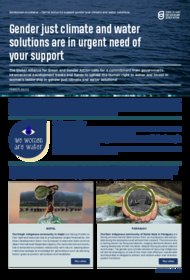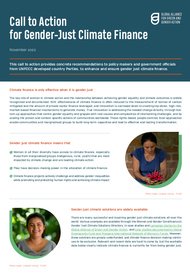If we women don't speak up, no one will speak for us
By
Maaike Hendriks and
Tamara Mohr
This February women environmental defenders from around the world met each other in Indonesia. All these defenders face structural violence. GAGGA, the Global Alliance for Green and Gender Action, supports these women. This meeting in Indonesia provided a unique space for women, trans-, intersex and non-binary people who are often the subject of conversation but rarely have the opportunity to engage with each other and meet other defenders from around the world. For they are all amazingly knowledgeable, strong and resilient women whom we should take seriously.
“From Sexual and domestic violence to kidnapping and murder. In their efforts to defend their land, territories and natural resources, women and girl environmental defenders (WGEDs) around the world are experiencing various forms of structural violence. The violence they experience ranges from the physical to the spiritual. From dislocation and dispossession, to harassment and defamation. From sexual and domestic violence to kidnapping and murder” (this is from this report by the global Gagga-alliance from 2021).
Coming together as a follow-up
As a follow-up to this study around 25 - mostly women - representatives of community-based organisations from 12 countries in Latin America, Africa, Asia and Eastern Europe met in Indonesia from February 19 to 21 for a mutual sharing and linking gathering. The meeting and the study are the initiative of the Global Alliance for Green and Gender Action (GAGGA), an alliance led by the Central American Women’s Fund (FCAM) with Both ENDS and Mama Cash and are supported by the Ford Foundation. Read this blog written by Tamara Mohr and Maaike Hendriks who attended this meeting in February.
Living in safe houses and finding a bullet on your doorstep
One woman representing an indigenous group in her country has received so many death threats and anonymous people staking her house that she had to flee to the capital city. There she is in constant hiding, moving from one safe house to another, continuing as best as she can under the circumstances to fight for indigenous women’s rights and security. She is extremely sad and depressed that she cannot go home to her village and family. She should flee the country to be safer, but could not stand the loneliness, she said. There is no hope under the current regime in her country that her situation will improve.
Another women from Latin America shared how she has already lost 7 family members who were killed by the military and how she found a bullet on her doorstep. She is heavily traumatized. Her village must be evicted for a government-initiated project. No compensation is offered, the community is forced to move. Only asking for justice led to relentless violent actions and threats.
Safe space to share
The 25 women shared their experiences, talked about the violence in their contexts as well as the strategies they developed to protect themselves and their communities. Together they formulated advise for funders. Both ENDS in its joint advocacy work with partners is aware of the threats they often face because of their actions. In our conversations with funders, we have identified a growing interest to support these women defenders and the willingness to better understand their situation, their needs and ways to support them directly.
Injustice and colonialism continue
Listening to the participants in the meeting, what struck me is how they are victims of injustice and colonialism that is still continuing today. Most of these women rightfully defend their territories and livelihoods against the impact of developments conceived by and benefiting others. They face the impact of hydroelectric dams, large scale mining, infrastructure and monoculture plantations. Mostly for products we all consume without wanting to know what harm it caused to others. For these ‘development projects’ communities are evicted from their land or have to accept living with polluted water, air and land, with a detrimental effect on their health, income and living conditions. And climate change, leading to extreme droughts or floods, heat waves and fires is exacerbating their situation.
Fighting for your rights and being labelled terrorist
When leaders in the communities – the majority of which are women who most directly feel the impact as they are taking care of the family and community – organise themselves and fight for their rights, they are labelled ‘terrorist’ and ‘anti-development’. Instead of listening to them and taking their complaints serious they face harassment, intimidation, criminalisation and even murder.
Living in constant fear
Most of the participants in the Indonesia meeting live in constant fear, their kin and peers have been killed and they themselves have received death threats on numerous occasions. Some have gone into permanent hiding or live under the constant threat of being arrested and jailed without trial. On top of that conditions are created to weaken them and to silence them, ranging from legislation that makes it impossible to receive funds from abroad to closing down organisations, bank accounts and websites, confiscating computers and even burning down villages or safe houses.
These women know best
Still, once again and not surprising to me but unfortunately not common knowledge, is that these women know best what needs to be done and how to react. They have developed strategies to survive and to voice their complaints. They can’t continue without solidarity and collective care. They will be more successful when they engage in joint advocacy and if we all invest in alliance- and cross-movement building. At the last day the participants developed concrete recommendations to funders who are interested to support these powerful women, trans-, intersex and non-binary people. They defined what needs most support and how support can be best provided. They provided concrete advice on how current funding practices can be improved or changed.
Take them seriously
The first thing we should do is take them seriously. Instead of treating defenders as poor, dependent recipients of charity, funders and defenders should become partners who jointly define what works best. We should get rid of any mistrust and endless bureaucratic steps to avoid risks of misuse of money. For the defenders, the funding needs to be flexible, there is no other way. And who are we to mistrust anyone who fights for the rights of their communities, cleaning up the mess of others, risking their health, family and lives. If we are mitigating risks, we should first of all look at the risks faced by these women and make sure they stay safe. We are looking forward to taking all these learnings to future donor spaces.
Foto credit: Mas Binbin
Read more about this subject
-
Dossier
Global Alliance for Green and Gender Action (GAGGA)
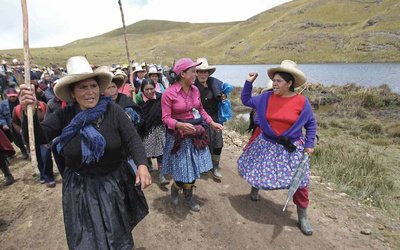
GAGGA rallies the collective power of the women's rights and environmental justice movements to realize a world where women can and do access their rights to water, food security, and a clean, healthy and safe environment.
-
Blog / 7 December 2017
Feminism in Latin America: rituals, solidarity and the link with the environment
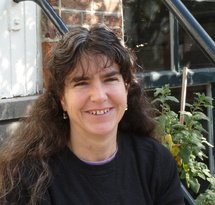 By Tamara Mohr
By Tamara MohrAt the end of November EFLAC, the most important gathering of feminists from throughout Latin America and the Caribbean, took place in a park just outside Montevideo, Uruguay. Within Both ENDS, I coordinate the GAGGA programme, in which we promote cooperation between the environmental and women's movements. Our partners Mama Cash and FCAM persuaded me that this meeting was the perfect opportunity to find out whether and, if so, in which way women are interested in the environment. They had prepared me for a very intensive meeting, at which the whole spectrum of emotions would be aroused and expressed. I had no idea what to expect and set off with a completely open mind. And so it came that I spent four days among more than 2,000 women from across the continent.
-
External link / 29 May 2019
Women say “no” to mining (Annual Report 2018)
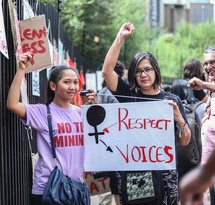
Mining often has a huge and devastating impact on the environment, including water, air and forests. It can profoundly affect nearby communities, not only by harming local ecosystems, but also by exacerbating or provoking societal tension. In many places across the globe, women are leading resistance to mining and the 'extractivist' model.
-
Blog / 7 December 2020
Five years of GAGGA: “Once you understand what gender justice is about, your perspective will change for good”
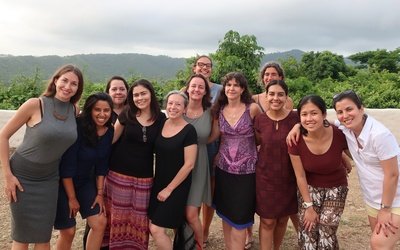 By Annelieke Douma and Tamara Mohr
By Annelieke Douma and Tamara MohrAlmost five years ago, the Global Alliance for Green and Gender Action (GAGGA) started its journey to bring together the often still quite separate worlds of environmental justice organisations and the women's rights movement. At Both ENDS, Annelieke Douma and Tamara Mohr have been coordinating the GAGGA programme. Together they look back at five years of learning, connecting and enjoying the fruits of this innovative programme.
-
Blog / 8 March 2019
Women lead struggle for land rights for the Avá Guaraní
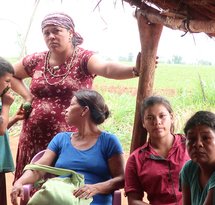 By Tamara Mohr
By Tamara MohrTogether with five women from the Platform Suace Pyvyvõhára, I travel to Mingã Pora in the east of Paraguay. Around 45 families from the indigenous Tekohá Suace community settled here in 2016. In Guaraní, Tekohá means 'the place where we are what we are'. They reside in tents - self-made out of waste materials - on a small strip of land with a soy field on one side and a nature reserve owned by the Itaipu company on the other.
-
Video / 12 September 2018
Water defenders

Latin American partner organizations of GAGGA launched the campaign "We, women, are water" in March 2018. This video was launched as part of this campaign, and emphasizes the role of women water defenders.
-
Video / 12 September 2018
Water is a common good

The Latin American partner organizations of GAGGA launched the campaign "We, women, are water" in March 2018. This video was launched as part of this campaign, and emphasizes the importance of recognizing water as a common good.
-
Video / 12 September 2018
Women are water

Latin American partner organizations of GAGGA launched the campaign "We, women, are water" in March 2018. This video was launched as part of this campaign, and emphasizes the role of women in the sustainable management of water in Latin America.
-
Event / 23 March 2023, 13:15 - 14:30
Making finance for gender just water and climate solutions a reality!
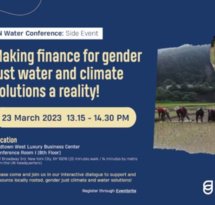
The UN Water Conference is an important event that brings together stakeholders from around the world to discuss water and climate solutions. This year, GAGGA is organizing a side event during the conference that you won't want to miss!
On Thursday March 23rd, from 1.15 -2.30 pm, GAGGA will present their commitment to support, finance, and promote locally rooted, gender just climate and water solutions within the Water Action Agenda. This event will inspire other stakeholders to join in their commitment, while presenting inspiring examples of such solutions presented by local women from Nepal, Kenya, Paraguay, Mexico, and Nigeria.
-
Publication / 15 March 2023
-
Event / 4 November 2021, 13:15 - 14:30
UNFCCC COP 26 side event 'Gender-just climate finance: from barriers to actionable solutions'
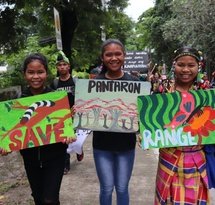
With gender-responsiveness a work in progress, current climate funds are hardly accessible for women-led community based organizations. While these groups lack access to finance and decision-making, they already lead bold holistic gender-just climate solutions and initiatives worth funding support.
Follow this event live on YouTube!
-
News / 8 March 2021
GAGGA launches “We, Women are Water” campaign 2021
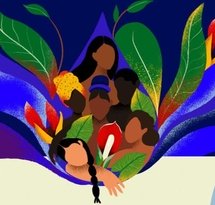
On International Women's Day (March 8th) the Global Alliance for Green and Gender Action (GAGGA) will launch the "We, Women are Water" campaign to highlight women's role, demands and actions in ensuring water security in the face of climate change.
-
News / 3 June 2020
Green light for FGG and GAGGA!
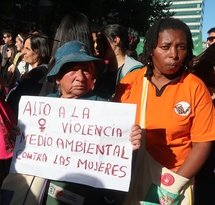
Last Friday, 29 May, it was announced that both the Fair, Green and Global Alliance (FGG) and the Global Alliance for Green and Gender Action (GAGGA) have been selected as two of the 20 potential strategic partnerships of the Dutch Ministry of Foreign Affairs for the 2021-2025 period. Both ENDS is pleased that the Dutch government is seriously considering extending its support to these networks, as they show that cooperation on the basis of equality between grassroots organisations and NGOs throughout the world can continue to bring about change in the position of women, in respect for human rights and in making trade chains and financing systems sustainable.
-
News / 23 March 2020
Women in Latin America claim their right to water
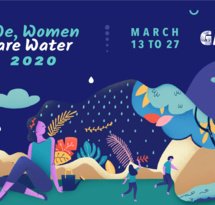
In many places in Latin America, access to clean water is under great pressure from overuse and pollution, often caused by large-scale agriculture or mining. This has significant impact, especially on women. In March, with International Women's Day on March 8 and World Water Day on March 22, they make themselves heard and claim their right to water.
-
External link / 31 May 2018
Harnessing the power of the women’s rights and environmental justice movements (Annual Report 2017)
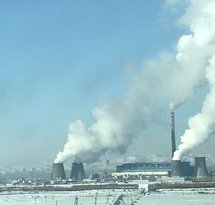
It was minus 20 degrees Celsius when 2.000 women gathered at the main square of Ulaanbaatar, Mongolia, to voice their distress about the terrible smog in the city caused by three large power plants. Soon after, the women were invited to speak about the problem of air pollution with the minister of environment.
-
News / 8 March 2018
Only 0.2 % of all foundation funding for women & environment
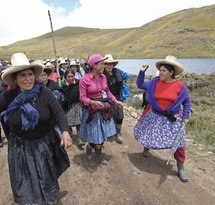
Women around the globe are at the forefront of addressing the impacts of climate change and environmental degradation, designing, implementing, and scaling up their own solutions. Socially defined gender roles often position women and girls as stewards of the physical, economic, and cultural well-being of their communities.
-
Event / 7 March 2018, 15:00 - 16:30
Women's Rights & Climate Finance Webinar: getting the money to the people
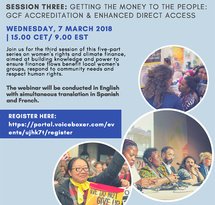
Join us for the third session of this five-part series on women's rights and climate finance, aimed at building knowledge and power to ensure finance flows benefit local women's groups, respond to community needs and respect human rights.
-
News / 22 June 2017
Demonstrating for environmental and human rights in Guatemala
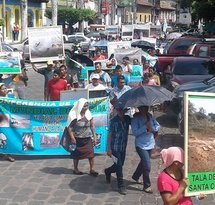
On June 5th, World Environment Day, community members at the southern coast of Guatemala protested against the rapid spread of large-scale palm oil, sugar cane and banana plantations in their region. Utz Che', our local partner organisation, joined the march.
-
Event / 5 March 2023, 13:00
Feminist March
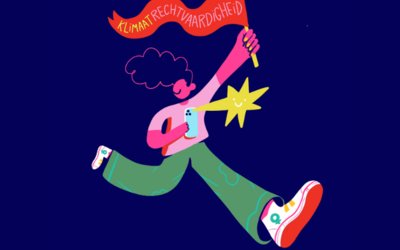
On Sunday March 5 Both ENDS will be joining the Feminist March (called Women's March before). It starts at 1 PM at De Dam in Amsterdam.
With our block "Feminists for Climate Justice" we'll gather in front of Madame Tussauds.
-
Publication / 4 November 2022





